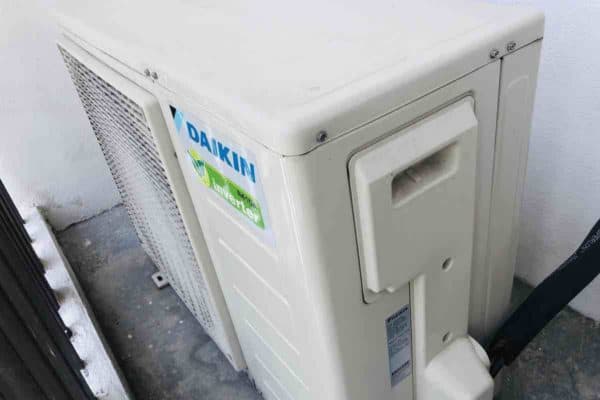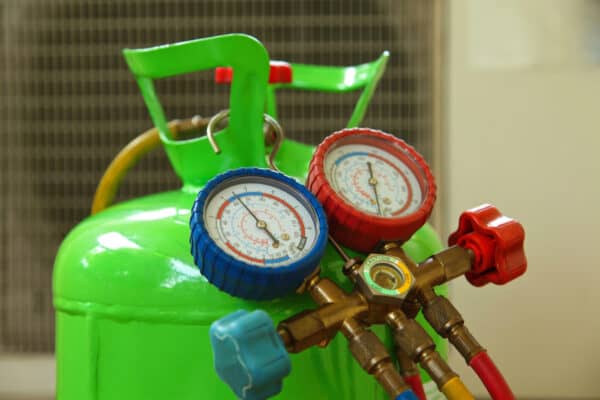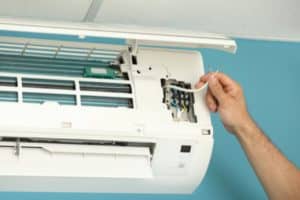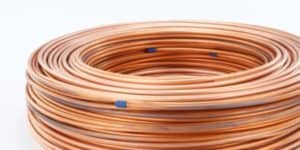Is It Better to Leave the AC On When Not Home? (Explained)
Many people say that leaving the AC on when not home is better than turning the AC off because it saves money and less service is needed. However, many homeowners are skeptical about it, something is not right here. So, it is true that leaving the ac on when not home is better?
The truth is, if you don’t need cooling, you should turn the air conditioner off. The energy usage of air conditioners is based on their operating hours. The longer the air conditioner runs, the more power it consumes. Therefore, unless you need to maintain a certain indoor condition, you should always turn the air conditioner off when you’re not home.
There are a lot of misunderstandings when it comes to leaving the AC on when not home. Many people including some experts believe such a practice is better for the AC. However, it is not entirely true. Understanding the science and calculation behind AC power consumption can clear things up.
Why You Should Not Leave AC On When Not Home?
It is not cheaper to leave the AC on when you’re not home. In fact, leaving the AC on when not home is a waste of energy. You’re paying more than you’re supposed to.
Fundamentals
According to the zeroth law of thermodynamics, the outside temperature will always balance with the temperature inside your house. It is known as thermal equilibrium.
Furthermore, according to the second law of thermodynamics, heat will always flow from hotter regions to colder regions. Thus, your house will get hotter if the outside air temperature is higher. In HVAC, it is known as heat gain.
During summer, the outside air temperature can easily go beyond 24°C (75°F) which is above the temperature where we usually feel comfortable. As a result, the temperature inside your house will increase and you’ll need cooling to be comfortable.
Air conditioners work by absorbing heat inside your house and rejecting the heat outside your house. Hence, when you turn the AC on, it keeps removing the heat inside your house to keep you cool.
Now, when you’re not home, whether the AC is on or off, your house will still experience heat gain. However, if the AC is on, the heat gain is quickly removed, keeping the house cool. On the other hand, if the AC is off, the heat gain will eventually stop once it reaches thermal equilibrium.
So, unless you have things like data servers that need a consistent room temperature, why do you want to keep removing the heat inside your house when you’re not home? Isn’t it literally a waste of energy?
Power Usage Calculation
Some people pointed out that turning on the AC when you back from work is more energy-consuming than leaving the AC on all day while you’re not home. But, that doesn’t sound right either.
As mentioned earlier, the power consumption of air conditioners is depending on their operating hours. In other words, the longer the air conditioner runs, the more power it consumes.
A typical 3-ton single-phase (220V) central furnace split combo HVAC unit draws about 10 amps of electric current. Hence, we can calculate the power consumption as follow:
P = IV
P = (10)(220)
P = 2200 W
The result is 2200 W which is equivalent to 2.2 kW per hour or 2.2 kWh. In other words, if the HVAC unit draws 10 amps of electric current per hour, it is the same as consuming 2.2 kW per hour or 2.2 kWh.
Now, an electric current of 10 amps is usually the rated current of a typical 3-tons HVAC unit. Because HVAC units draw different amperages based on different operating conditions, the maximum current they can draw is usually around 14 amps.
Most manufacturers don’t provide the maximum current of their HVAC units in their brochures. However, they do provide the circuit breaker size which is 20 amps for the 3-ton model. See the below illustration:

With the circuit breaker size, we can safely assume that the 3-ton HVAC unit won’t go beyond 20 amps. Hence, at 20 amps, the power consumption is 4400 W or 4.4 kW per hour or 4.4 kWh given that the voltage is assumed to remain at 220V.
Now, the idea that leaving the AC on all day instead of turning it off when you’re not home and then turning it back on when you’re home is to avoid stressing the HVAC unit due to the fact that the HVAC unit needs to work harder to cool the hotter house if you’re not leaving the AC on all day.
A typical 3-ton HVAC unit takes about 3 hours to cool a 2000 sqft house from 30°C (86°F) to 24°C (75°F). Assuming that you turn the AC back on at 6pm when you’re home and then leave it on until 7am in the morning, the total power consumption can be calculated as follow:
Peak power consumption = 4.4 kWh x 3 hours = 13.2 kW
Rated power consumption = 2.2 kWh x 10 hours = 22 kW
Total power consumption = 35.2 kW
When you first turn on the AC, it consumes the most power in the first 3 hours and the maximum power it can consume is 4.4 kW per hour as discussed earlier. After that, we assume the AC returns back to the rated power consumption which is 2.2 kW per hour, also as discussed earlier.
Therefore, the total power consumed in this setup is 35.2 kW.
Now, let’s calculate how much power may be consumed by the AC if we let it run all day. Since we never turn it off, let’s assume it runs at the rated power of 2.2 kW for 24 hours. So, the total power consumption is 52.8 kW.
Clearly, leaving the AC on when you’re not home is not a good idea from the power usage standpoint. The power consumption of the AC running all day long is 1.5 times more than turning it off when you’re leaving the house.
Running at maximum load for 3 hours can’t be consuming more power than running at rated load for 11 hours, isn’t it?
Remember that your HVAC unit doesn’t magically consume super high power when running at full load, the maximum power it can draw is limited by its capacity and a good reference is the circuit breaker size.
Repair & Service
Another argument on whether or not it is better to leave the AC on all day is the frequency of repair and service you need for the AC. Some people said that turning the AC on and off will cause more wear and tear and thus, saves you on the electricity but costs you more on the repair and service.
But, is that true?
Generally, the lifespan of mechanical systems is depending on their total operating hours. The more you use a machine, the quicker it wears out and that’s no different for air conditioners.
Running the AC for 24 hours causes more wear and tear than only running the AC for 13 hours. Furthermore, the AC is designed to run at maximum load for a prolonged period of time. Hence, running it for 3 hours is not a big deal.
Many buildings have undersized air conditioners. As a result, those air conditioners are running at maximum load all the time. However, we only see the difference in terms of the frequency of repair and service in the order of years.
So, you’re better off turning the AC off in the morning, when you’re off to work, not home.
Fixed Speed vs Variable Speed
Most central air conditioners have a fixed-speed compressor. The compressor will turn on and off based on the room temperature.
On the other hand, new central air conditioners have a variable-speed compressor. The compressor can operate at a different percentage of capacity (eg: 25%, 50%, 80% or 100%) based on the needs.
Some people claimed that if you turn the AC on every time you’re back from work, the lifespan of the compressor gets shortened because it has to start all over again. However, it is not true either.
When you leave the AC on all day, the fixed-speed compressor nonetheless will shut off and turn back on frequently. It does so to maintain the room temperature. Turning the AC on to cool a hotter house does not magically makes the compressor work harder than usual. It’ll still be on and off like it normally does.
For variable-speed air conditioners, the same applies. The longer you run the AC, the more power it consumes, period.
Reasons to Run the Air Conditioner When Not Home
From the energy usage and thus, the electricity cost standpoint, it is better to turn off the AC when you’re not home. However, there are times when it is necessary to leave the AC on when you’re not home.
- Data Server – If you have a server in your house that may be damaged when exposed to high temperatures, you need to leave the AC on even though you’re not home using it.
- Pets – If you’re leaving pets in your house when you’re off to work, it may be a good idea to leave the AC on for them.
- Important Stuff – If you have any other things that you need to maintain decent temperature control, you may need to leave the AC on all day.
Some people like to take a summer break from their home. Usually, they live in a place where it gets super hot in the summer. So, it may be a good idea for them to run the AC all day to prevent certain things from spoiling.
On some occasions, people are concerned about the humidity level in their home if they don’t run the AC all day. However, it is not as bad as they think.
In countries like Malaysia (where I live) and Singapore, the outdoor air temperature is around 30°C (86°F) and the humidity level is around 75% all the time. Nonetheless, most of us don’t leave our house with the AC on and we don’t have high humidity issues like mold and fungus growing.
If you have high humidity issues, it may not be the operating hours of the AC but other issues like oversized AC, poor ventilation and water leakages.
In short, if you don’t need the AC, don’t run it. It saves you electricity, money and it is better for the environment.
How to Run the AC More Efficiently At Home?
Some people can’t bear the hot weather and it takes too long for the AC to cool the house (usually 3 hours as mentioned earlier). Thus, they have no choice but to leave the AC on even when they are not home. However, their electricity cost is too high. So, how can you run the AC all day efficiently?
Temperature Settings
If you’re living in a very hot place where the outdoor temperature can go up to 35°C (95°F) in the summer, you can set the thermostat at 28°C (82°F) and let it run all day. It’ll consume less power but still more than if you would turn it off.
Schedule Time
A better way to save electricity for your AC is to schedule the time to turn on your AC automatically before you reach home. However, most of the time, you need to upgrade the existing thermostat to a smart thermostat or equivalent that has a scheduling function.
Ductless Mini Split Air Conditioner
The problem with central air conditioners is that they take hours to cool the entire house. Whereas with ductless mini split air conditioners, you can expect to only take around 30 minutes to cool the entire house depending on the number of units you have.
In hot and humid countries like Malaysia and Singapore, most of us use ductless mini split air conditioners in our home. Usually, every room has one unit. The living room may have two units depending on how big the room is.
Whenever we need the AC, we’ll just turn the AC on in the respective room while the rest of the units can stay off. Thus, we don’t waste money on unnecessary cooling.
Conclusion
It is better to turn the AC off when you’re not home unless there are valid reasons to do so because it saves energy, money and it is better for the environment.
When you’re not home, you don’t need the AC to keep removing heat from the house. Furthermore, running the AC all day does not save you money but it in fact costs you more because running the AC for 24 hours is 1.5 times more power-consuming than running it for 13 hours only.
In addition, the longer you let the AC runs, the more wear and tear it experiences. It is the same for both fixed-speed air conditioners and variable-speed air conditioners.
If you absolutely need to run the AC all day even when you’re not home for several reasons, set the thermostat at a higher temperature to optimize power consumption. Besides, you can schedule the time to turn on the AC a few hours before you reach home to avoid running it all day and save power as well.
Finally, ductless mini split air conditioners cool much faster than central air conditioners and thus, they may be a good solution for you to not have to run the AC when you’re not home.
If you have anything to add (or ask) about this topic, leave a comment down below!









